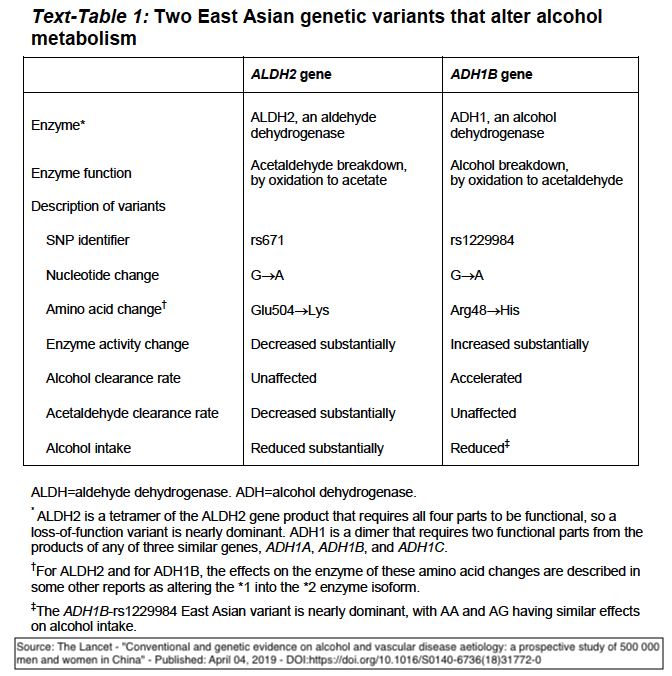Not everyone has the ability to easily and quickly metabolize Acetaldehyde into harmless acetates.
Approximately 560 million people in the world, mostly of East Asian descent, experience an unpleasant reaction commonly called the “Asian Flush.”
People with these polymorphisms experience unpleasant symptoms when they drink alcohol. Symptoms include reddening of skin on the face, neck and chest from dilation of blood vessels, rapid heartbeat, a drop in blood pressure, nausea, headaches, and trouble breathing.
“Flush” syndrome is most prominent in East Asians
According to ALDH2 polymorphism and alcohol-related cancers in Asians: a public health perspective:
“The ALDH2*2 variant is essentially absent among the Europeans, but is highly prevalent among East Asians [22]. Large scale genotyping and haplotype analysis of the ALDH2 gene has traced the origin of the ALDH2*2 allele back to the ancient Pai-Yuei tribe about 2000–3000 years ago in Southeast China. The ALDH2*2 allele likely dispersed from its origin toward East Asia with the highest frequencies in Southeastern coastal regions of China (e.g. Guangdong, Fujian provinces) and countries with historical Han migrations, such as Taiwan, Japan, Korea and Singapore.
“The prevalence of the ALDH2*2 variant varies from 28% (e.g. in Korea) to as high as 45% (e.g. in Taiwan) in populations of these regions and an estimated 560 million East Asians are carriers of ALDH2*2 [25]. The ALDH2 deficiency is therefore one of the most common and genetically uniform enzymopathies in human carried by approximately 8% of the world population.”
The Millwood study stated that the investigators selected the two genetic polymorphisms as instrumental variables for their study because the acetaldehyde syndrome’s effects are so unpleasant that those who experience it are less likely to consume alcohol. In other words, the two polymorphisms directly decreased alcohol consumption.
Alcohol metabolism and two key polymorphisms
In humans, alcohol metabolism involves two types of enzymes: alcohol dehydrogenase (ADH) and aldehyde dehydrogenase (ALDH). When alcohol is consumed, the ADH converts it to acetaldehyde which is a potent toxic chemical carcinogen. However, ALDH quickly converts the acetaldehyde into acetate which the body can use for energy.
There are several ALDH genes that produce different enzymes found in various parts of the body, but the most important is ALDH2, which is found widely in body tissues and is especially abundant in the liver.
ALDH2 is responsible for more than 90% of acetaldehyde detoxification. A variation of ALDH2 — ALDH2-rs671 is affected by a Single Nucleotide Polymorphism (SNP) that drastically reduces enzyme effectiveness.
ALDH2-rs671 individuals whose genotype has two copies of the SNP (homozygous) have close to 0% effectiveness. The enzymatic efficiency of a heterozygous genotype ranges from 17-38%.
These extreme reductions in enzyme activity allow acetaldehyde to accumulate.
While the Millwood investigators noted that ALDH2-rs671 was the most important variant, the accumulation of acetaldehyde can aggravate in individuals who have an ADH1 gene polymorphism– ADH1B-rs1229984. This variant has an accelerated ability to convert alcohol to acetaldehyde, thus further increasing its accumulation in the presence of ALDH2-671’s diminished ability to convert it to acetate.
ALDH2-rs671 is also known as ALDH2*2



Comments are closed.